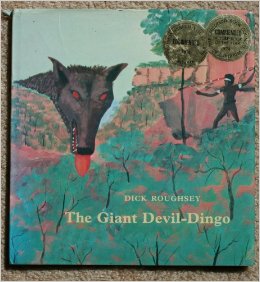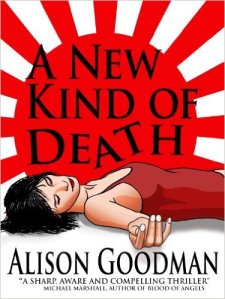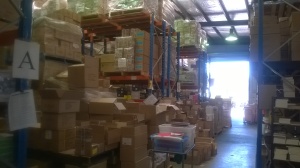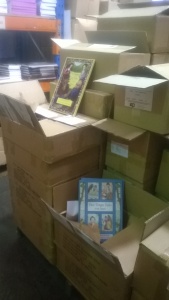The book industry is a complex mosaic, made up of many interlocking parts and links. People outside it can usually name at least some of the professions involved: authors, publishers, agents, booksellers, libraries..But anyone inside it knows there are many other professionals involved–professionals who also provide essential links between a book and its readers. And one of the most important of those links are the people who make sure books get to bookshops, whether bricks-and-mortar or online, and to libraries: distributors. Without distribution, whether handled inhouse as with many big publishers, or co-operatively between publishing houses, as with others, or with independent operators, no book would get to its intended readership. Or at least very few people would know about it. And yet, despite the importance of distributors, many authors aren’t clear on what is involved in the business of distribution, and of course most people outside the industry have no idea about it at all.
Distribution is also one of the main issues crucial to the success or otherwise of small publishers and self-publishers(or independent authors). Without good distribution, books published by small presses and self-publishers can easily get lost, unnoticed in the tsunami of publications distributed by the big operators. And to try and distribute your own books nationally, outside of your own local area, is both
very complex and prohibitively expensive. So when we started Christmas Press in 2013, distribution was very much on our minds–and on the recommendation of many bookshops, we contacted the major independent distributor, Dennis Jones and Associates, and have worked with them ever since.
So today I’m publishing an interview I did recently with Dennis Jones himself, co-founder with his wife Lea of DJA, which gives a fascinating picture not only of how distribution works, but also of a long career in the Australian book industry.
Dennis, you had a long experience in the Australian publishing industry before you set up DJA. Can you tell us about that?
I was very fortunate to be employed by William Collins in 1970 as an executive trainee working from the Melbourne office. One of 150 or so applicants, I worked initially under John Cody who was one of the directors.
By 1972 and due to William Collins purchasing the Leutenegger / Ungar owned Forlib national wholesale businesses, I became responsible for the State office of William Collins. This acquisition gave William Collins the strongest book distribution structure in Australia as well as stock holding warehouses across Australia, including one in Launceston and one in Hobart. From 1972 to 1991 I was in various management roles in both Melbourne and Sydney. The work was both breathtaking and exhausting, and it taught me the value of working with a team – some of whom you openly disagreed with and those who are still my friends today. My first Managing Director was Ken Wilder who together with Stephen Dearnley, Anne Bower-Ingram and Sir William Collins were at the cradle of Australian publishing (even though it was a foreign-owned business).
 To meet and work with the likes of Dick (Goobalathaldin) Roughsey & Percy Trezise, Xavier Herbert, Graham Pizzey and so many more was amazing! It enabled me to know the Oldmeadow family, Albert Ullin, and booksellers who were as strong on stewardship then as their contemporaries today. I was also fortunate to work with Judy Taylor (The Bodley Head) when she visited Australia. Whilst Collins had the Commonwealth- rights mass market content like the Dr Seuss brand, the Bodley Head had wonderful authors and illustrators like Maurice Sendak, Tomi Ungerer and Pat Hutchins and so on. It was while I was with Collins that I
To meet and work with the likes of Dick (Goobalathaldin) Roughsey & Percy Trezise, Xavier Herbert, Graham Pizzey and so many more was amazing! It enabled me to know the Oldmeadow family, Albert Ullin, and booksellers who were as strong on stewardship then as their contemporaries today. I was also fortunate to work with Judy Taylor (The Bodley Head) when she visited Australia. Whilst Collins had the Commonwealth- rights mass market content like the Dr Seuss brand, the Bodley Head had wonderful authors and illustrators like Maurice Sendak, Tomi Ungerer and Pat Hutchins and so on. It was while I was with Collins that I  met memorable authors like Sir David Attenborough, Jackie Collins, David Kossoff. Theodor Geisel (Dr Seuss), Michael Bond (Paddington): there were so many it was a time to really test the strength of the business and our interest in books and reading. We also had amazing in-house publicists who were engaged with our peak book objectives intrinsically. The other side of working in a large organisation was the organisation! We had about 350 employees across distribution, marketing, sales, publishing, and the usual corporate structure. So many of my work colleagues went on to be leaders in the industry in the years that followed.
met memorable authors like Sir David Attenborough, Jackie Collins, David Kossoff. Theodor Geisel (Dr Seuss), Michael Bond (Paddington): there were so many it was a time to really test the strength of the business and our interest in books and reading. We also had amazing in-house publicists who were engaged with our peak book objectives intrinsically. The other side of working in a large organisation was the organisation! We had about 350 employees across distribution, marketing, sales, publishing, and the usual corporate structure. So many of my work colleagues went on to be leaders in the industry in the years that followed.
How and why did you set up DJA?
I was midway through a Grad Dip at Swinburne when I became immersed in a group of aspiring people who in a way tempted me to make some of my own career decisions; I also had a young family and was preparing to uplift them again to return to Sydney living for a second time… This return for one reason or another did not eventuate and so we stayed in Melbourne. Something happens to you when you are in your early 40’s, you do have brain snaps and enhanced vision of your future importance and relevance! At this time (late 1991) there was Gordon & Gotch as a book distributor and very few privately owned distribution businesses. So I envisaged resigning and starting a national book distribution business with my wife, $6000 in cash and complete ownership of our domestic home. In retrospect a real act of brain fade!
HarperCollins as it had become farewelled me in the style that a major business can for one of its sons, and we gave up many things in order to survive in our new venture. We had no marquee imprint or author to start off with, other than the Walshe family’s Australian Large Print list. Still if you can take pain you can grow a business! I was fortunate as over these early years I made continual representations to Ingram in US and eventually they retained me for representation in ANZ in 1993. The business with Ingram over the years grew 20 fold and enabled us to grow a business working only with a mix of Australian and imported physical books as well as representation via Ingram. We quickly dropped the foreign books stocked locally as by then there were so many businesses queuing up to collect foreign lists I thought we should go the other way and solely focus on Australian works. I also figured we could live frugally for many years on the meagre profits (or losses) if we controlled our overheads. Sometime in the mid 1990’s we shifted into our first warehouse.
 How does distribution work for both small press and self-published authors?
How does distribution work for both small press and self-published authors?
The authors / publishers lists are made available to any outlet via our daily onix files, our monthly new title order forms (available in print, ipad version, or electronically). The books are also offered to the booksellers across Australia by actual sales people who are either employees or sales agents. The publisher / authors deal with us either in a timely structured manner or not. The books are taken on a consignment basis and we pay on net sales. Sounds simple or does it? A small percentage of suppliers do not have commercial interests at the centre of the works they offer.
Across print, eBook, Print on Demand we have about 5000 Australian titles – some are across all three of our “platforms” We have no issue with size of publisher big, small,  specialized, digital only or the lot. As go into 2016 and with the arrival of global destination online vendors we can literally supply anyone, anywhere. Our eBook aggregation is something we have grown for 5 years. We now outrank all of the foreign eBook aggregators because of a good blend of local and global customers.
specialized, digital only or the lot. As go into 2016 and with the arrival of global destination online vendors we can literally supply anyone, anywhere. Our eBook aggregation is something we have grown for 5 years. We now outrank all of the foreign eBook aggregators because of a good blend of local and global customers.
It also helps if you enjoy reading and talking about books!
As I write this I am aware that our key times for 2016 positioning of new releases are almost on our doorstep. The behemoths are already manouvering for the end of year sales; we frankly struggle with being that organised as it is the nature of meeting the needs of publishers and authors as they choose to manage their output.
What are the challenges and pleasures for you and your team in the relationships with bookstores and libraries?
The pleasure comes from the challenge of success and the implications of containing opportunity. It is not an inexpensive experience funding a business like this.
 I remember the word “disintermediation” from some year ago and it terrified me. Well, we still are not members of TitlePage, nor are we members of any industry body as they simply don’t cater for a business working with all comers.
I remember the word “disintermediation” from some year ago and it terrified me. Well, we still are not members of TitlePage, nor are we members of any industry body as they simply don’t cater for a business working with all comers.
And we have not been “disinter mediated”!
Pleasure – look at those daily orders from the Library Suppliers, the online businesses – each morning the frenzy on the floor of the business to fill those orders where we are supplying actual demand and not speculative placement of books in a sale or return sense.
One challenge is also putting a monthly range to the market place in a hybrid situation of curating foreign published works as well locally authored works by Australian publishers. To retain credibility we do have be driven by the commerciality of our books to the booksellers, otherwise we are simply guilty of failing the time given to us by the booksellers.
I will extend the question to include our eBook booksellers.
We have very good relations with the eBook booksellers – this allows us to market, promote and price with consumers in mind. The pleasures are to see our content consumed in a multiple platform sense; print, eBook and Print on Demand to consumers globally. 
How do you decide whether to take on a publisher, whether small press or independent author?
Because of our Australian-only policy we have a commercial demand for more content, providing we know where the demand will come from as well as being at a price consumers will meet in the format they determine for that content. If it was an Engineering list we would have no idea who our principal resellers would be, if the price exceeds typical selling prices we won’t be able to get the booksellers to be moved top stock and sell. Then if it is something that is best suited to reflowable style – do we have eBook rights; providing we have global eBook rights.
 We find it difficult to work with creators who have chosen some of the foreign publish for profit businesses as our model requires mostly global agreements.
We find it difficult to work with creators who have chosen some of the foreign publish for profit businesses as our model requires mostly global agreements.
One of the major buying sectors is the library sector in Australia and they like fiction, providing the price, format, and subject is within their profile areas.
DJA carries a very large range of titles in many different genres and niches.
Are there areas that are easier to sell than others? Are there any titles that stand out for you, over the years?
A snapshot of the years would list three titles; Fat or Fiction (weight loss) where we sold over 50,000, Surfers Travel Guide (An Australian Surfing Book) sold over 50,000, Secret Girls Business (for young girls) continue to be a standout year after year. Weed Foragers Handbook – continual demand and publisher reprints, and time will tell as I feel Arthur Upfield will be on this list as well. The Upfield (Bony Series) have had extraordinary global success over the last 18 months as eBook, and the next “platform” for them will be short-run print, either via POD, or short run offset.
And the Tony Melvin / Ed Chan series on How to Legally Pay less Tax in Australia: so successful that Harper bought the rights from the authors!
Maybe the right answer is that where we have generous authors, publishers and publicists we can have a common passion which is always the right starting point; providing we have the right price and we know the place where the consumer demand can be satisfied.
How do you view the changes in the Australian book industry over the time DJA has been operating? And–wearing your prophet’s hat!– what further changes do you think might be coming?
 The changes have been mostly beneficial to consumers, no longer do you have to wait for the boat to dock from UK, no longer do you have to be at the behest of local list balancing by the majors, you can take your content in more than one form and the internet tells all. Whilst I would not use the internet to self diagnose illness it provides the location and availability answers for all book needs.
The changes have been mostly beneficial to consumers, no longer do you have to wait for the boat to dock from UK, no longer do you have to be at the behest of local list balancing by the majors, you can take your content in more than one form and the internet tells all. Whilst I would not use the internet to self diagnose illness it provides the location and availability answers for all book needs.
On the horizon?
*Government revenue building and the basic unfairness of local costs to support Government expense mayhem.
*We “the taxpayers” own Australia Post – so why is it cheaper to deliver from a foreign business to a consumer or bookstore in Australia than it is for me to deliver to the next suburb?
*Our local on costs are going to rise more quickly than business on costs in other parts of the world making us more expensive in an ongoing sense.
*Consumers decided years ago whether to buy local or buy foreign – this won’t change.
*The calibration of what is occurring with process of people writing, publishing and selling. We really have very little understanding of that change that occurred visibly overseas 10 to 15 years ago that  has be largely ignored in Australia – this process of what is branded “self-publishing” will continue to grow.
has be largely ignored in Australia – this process of what is branded “self-publishing” will continue to grow.
At the core is: Read lots and sell more!



One thought on “An essential book link: an interview with Dennis Jones, distributor”